10 questions to ask your next Group Income Protection insurer
last edited

Group Income Protection (GIP) pays insured employees a proportion of their wages if they’re too ill or injured to work for a sustained period. Yet good GIP is more than financial protection — it also offers vocational rehabilitation and absence management support.
A safety net… plus
A financial payment in case of illness or injury is a huge benefit for employees, the importance of which cannot be understated. However, GIP can also help prevent staff absence. It can support people who may be struggling at work by providing individualised plans which can include coping strategies and quick access to valuable services.
Earlier involvement from rehabilitation often provides better outcomes. Many insurers promote communication between managers and employees while offering not only employee support but training for managers so they can spot when an employee is in difficulty, and signpost them to the right services when they need them.
Benefits of rehabilitation for employers and employees
For employees, long-term sickness typically means being on reduced pay, and often a feeling of disconnection from the social benefits of work, loss of sense of purpose, or poor health and wellbeing.
Rehabilitation and absence management can positively impact outcomes, reducing the potential financial, emotional and physical consequences of sickness absence.
Meanwhile, employers may struggle to replace absent staff, risking business disruption and increasing pressure on remaining workers. Helping employees before a claim (or at the very least reducing how long they’re unwell) may also have a favourable impact on costs for employers at policy renewal.
So if you’re considering GIP for your business, what are the key things to understand?
10 essential questions you need to ask
1. How long has the insurer offered Group Income Protection?
The longer an insurer has offered GIP, the more experience they have dealing with claims, absence management and rehabilitation.
This should also give them experience of dealing with companies of all sizes, across different industries and related to multiple health issues. Unum is the UK’s leading provider of GIP by number of employers insured, ranging from multinational corporations to SMEs that to help support their employees through a period of illness at work or a prolonged absence.1
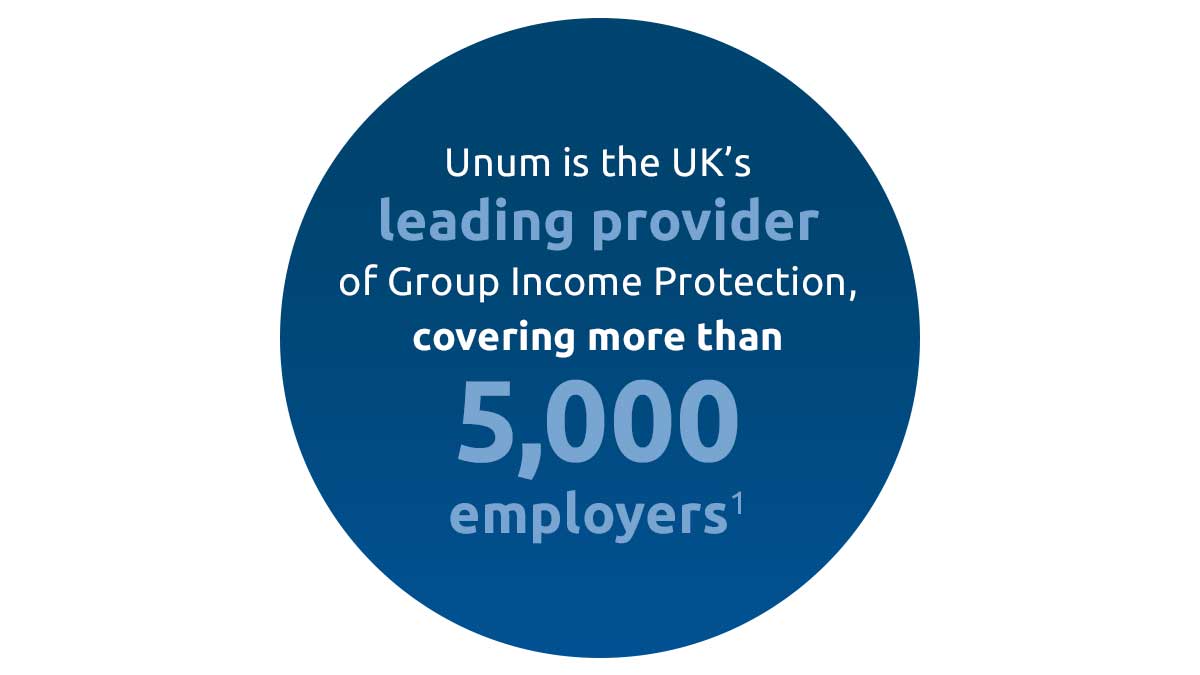
2. Does the insurer specialise in employee benefits?
Again, expertise is key. Does the insurer specialise in employee benefits, meaning policies such as GIP are their bread and butter?
If so, their entire ethos will be supporting employers and their employees, including dealing with claims and rehabilitation. It’s all they do.
For some insurers, employee benefits are just one type of insurance, which splits their focus. Insuring cars and homes is very different from protecting and assisting employers and their workers!

3. When is rehabilitation support available?
When should employees covered by GIP get rehabilitation support? Once they’re signed off sick, right?
Actually, early rehabilitation — as soon as the employee is struggling and before a claim — can positively impact outcomes.
That’s why Unum encourages employers to contact us as soon as they see signs of employees struggling. For employees covered by our GIP, employers can use our absence management helpline to check on the best course of action, if unsure.
Insured employees can request, either via their manager or direct, a Wellbeing Check. This is a 1-2-1 consultation with one of our in-house wellbeing professionals to look at all aspects of wellbeing before formulating realistic lifestyle changes to improve their performance, mood, energy and productivity.

4. What is the insurer’s return-to-work success rate?
A big test of an insurer’s rehabilitation is the proportion of employees they help return to work (or stay in work). A high success rate might reflect the quality of their absence management and rehabilitation services. In 2023, Unum was proud to report that 97% of people referred to our rehab team either returned to work or an otherwise agreed outcome with us.
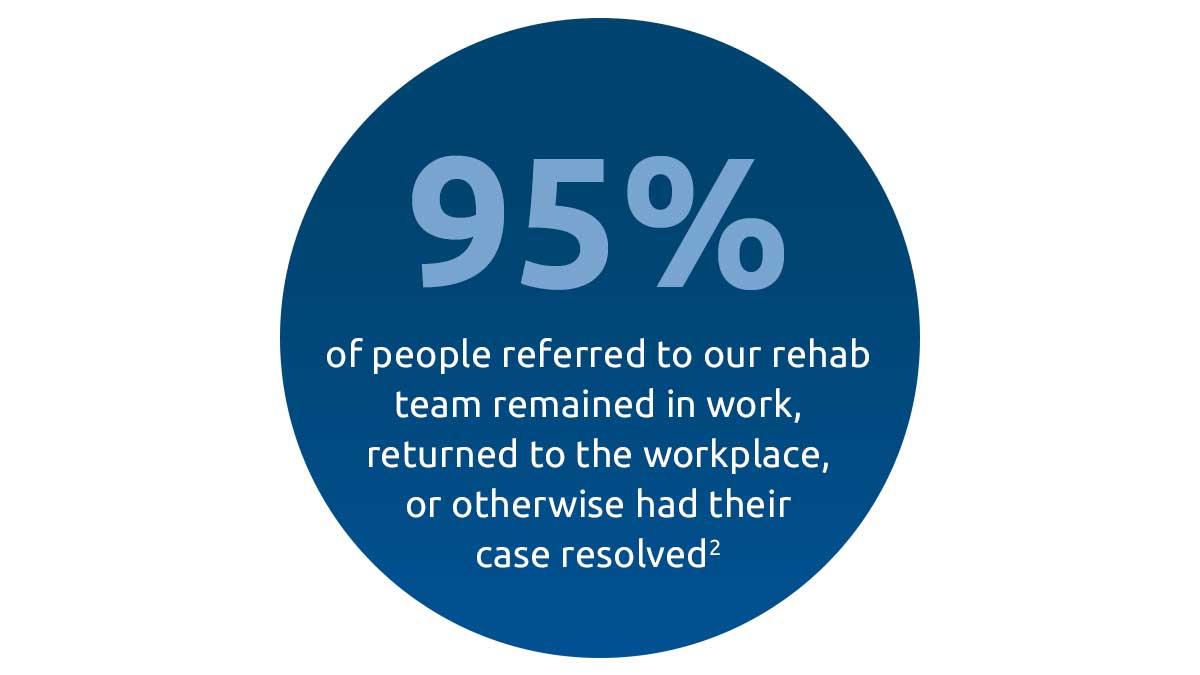
5. Does the insurer’s rehabilitation positively influence return-to-work success rate?
The return-to-work success rate is, of course, important. However, there can be multiple steps towards a final, sustained return to work.
Check if an insurer creates personalised, graduated return-to-work plans. These ease employees’ transition from sickness absence back to work. This approach can reduce ‘rebound’ absences, where employees feel they aren’t quite ready to return to work and their symptoms recur.
The true goal is not just getting employees back to work. It’s ensuring they can remain well enough to stay in work, with all the support they need to do so. Tools like Unum’s Return to work interview template, for instance, can give employers and employees clear boundaries as someone eases themselves back to full-time work.
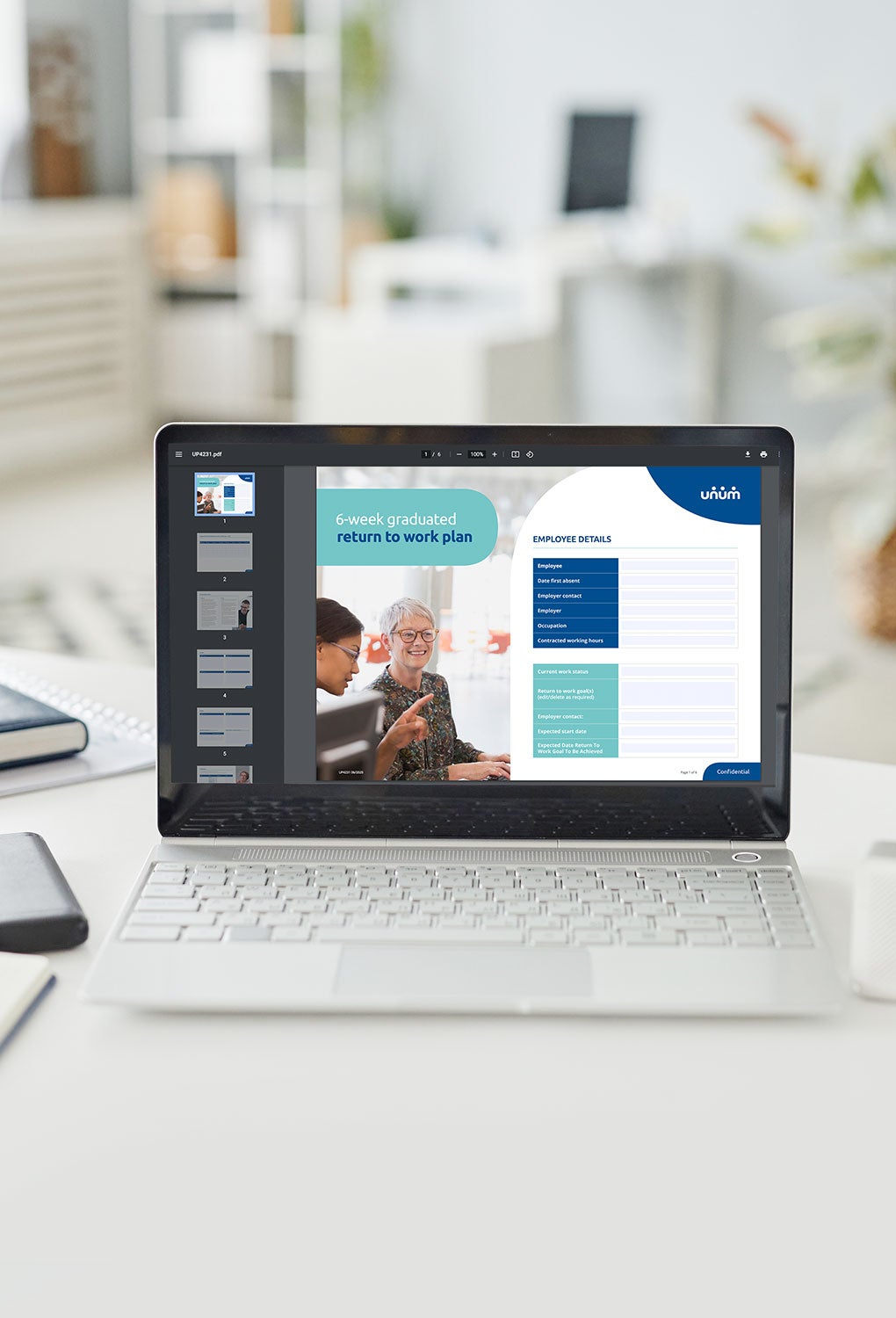
6. Does the rehabilitation service have a track record of reducing claim duration?
Whilst an early notification and referral to rehabilitation before an employee needs to claim can make a big difference, GIP insurers understand that people may still need to claim. GIP’s underlying purpose is, after all, a financial safety net against illness or injury.
With this in mind, check the rehabilitation team’s success in reducing claims duration. Does a referral to them reduce the length of time an employee is too unwell to work compared to no referral at all? Rehabilitation aims to build a successful, sustainable return to health and work as soon as the employee is well enough. The shorter the time an employee is unwell, the less daunting it can feel to return to the workplace.

7. Are the insurer’s claims and rehabilitation experts in-house?
When an employee needs to claim or requires rehabilitation, who provides this support, what are their qualifications and are they internal or external staff?
Rehabilitation and absence management services supported by in-house, practising medical professionals — such as doctors acting as medical advisers — offer invaluable depth of knowledge into illnesses and injuries.
An internal multi-disciplinary team offers a collaborative service for customers and can improve accessibility for people needing to claim or requiring rehabilitation support. It also potentially cuts referral times over insurers outsourcing to contractors (whose work with the insurer may not be their only job). Unum’s own specialist Vocational Rehabilitation team is in house, and comprises qualified, practising medical professionals in fields including occupational therapy, occupational psychology, physiotherapy and nursing.

8. Does the insurer offer employer support?
It’s great when insurers help keep employees well, but they can only do so much externally. Changes to improve workplace health and wellbeing must also come from within.
It’s therefore worth checking what else an insurer can offer your business. Unum provides a comprehensive Workplace Mental Health and Wellbeing review with dedicated Wellbeing Consultants who work with employers to review current health and wellbeing initiatives and offer recommendations tailored to their business. We’ll then work with the company over 12 months to implement them.
Line manager and HR training is key in reducing sickness absence and creating healthy workplaces. Sometimes, these courses offer CPD-accreditation on topics such as mental health, stress, cancer in the workplace, musculoskeletal disorders and more.
Unum’s workplace wellbeing workshops are available to both employers and employees. For employers, they can upskill and support employers to spot problems in their team, and provide them with the tools to offer timely, practical support to manage absences and wellbeing.

9. What other preventative services are available?
As well as line manager training, GIP providers may offer additional services. Unum provides a holistic suite of early intervention services, including:
- Employee workshops/training, examining small, achievable changes employees can make which can have big impacts on health, wellbeing and productivity.
- Specific support for common conditions, such as mental health: Unum GIP policyholders benefit from our Mental Health Support Pathway, bringing quick access to specialist support for both employees and businesses.
These can all contribute to healthier, happier, more productive workplaces.
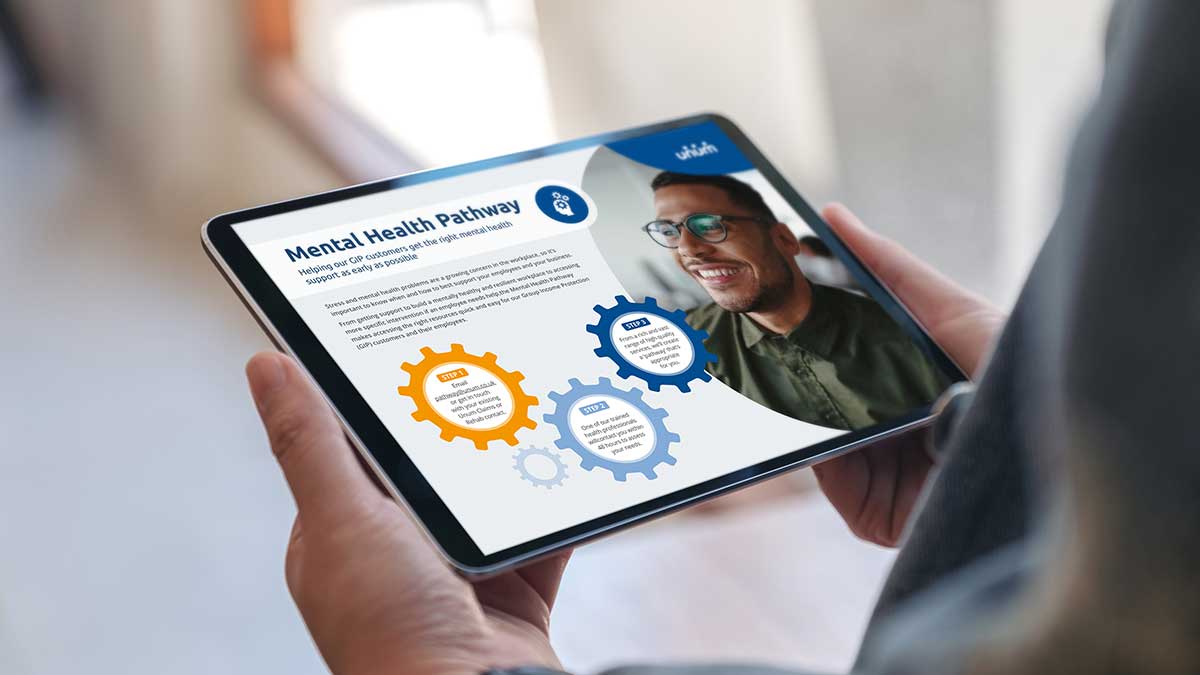
10. What added-value services do employees get access to?
Employees covered by GIP often get access to a wealth of added-value services, including:
- The award-winning health and wellbeing app Help@hand from Unum2 offers employees total support from proactive services to prevent illness or injury spiralling and causing a sickness absence, plus intervention services such as remote GPs and physiotherapy when a user already has a health concern.
- Employee Assistance Programmes that offer a range of practical support for everyday issues, including financial and legal support, a 24/7 helpline and a broad range of verified resources.
- Specialist cancer support, such as Unum’s own Cancer Pathway. This provides employees with practical and emotional support at diagnosis, through and after treatment, and even at end of life.
All these considerations can help employees prioritise wellness, so take time to explore them. They could truly benefit your workforce’s health, wellbeing and work/life balance.
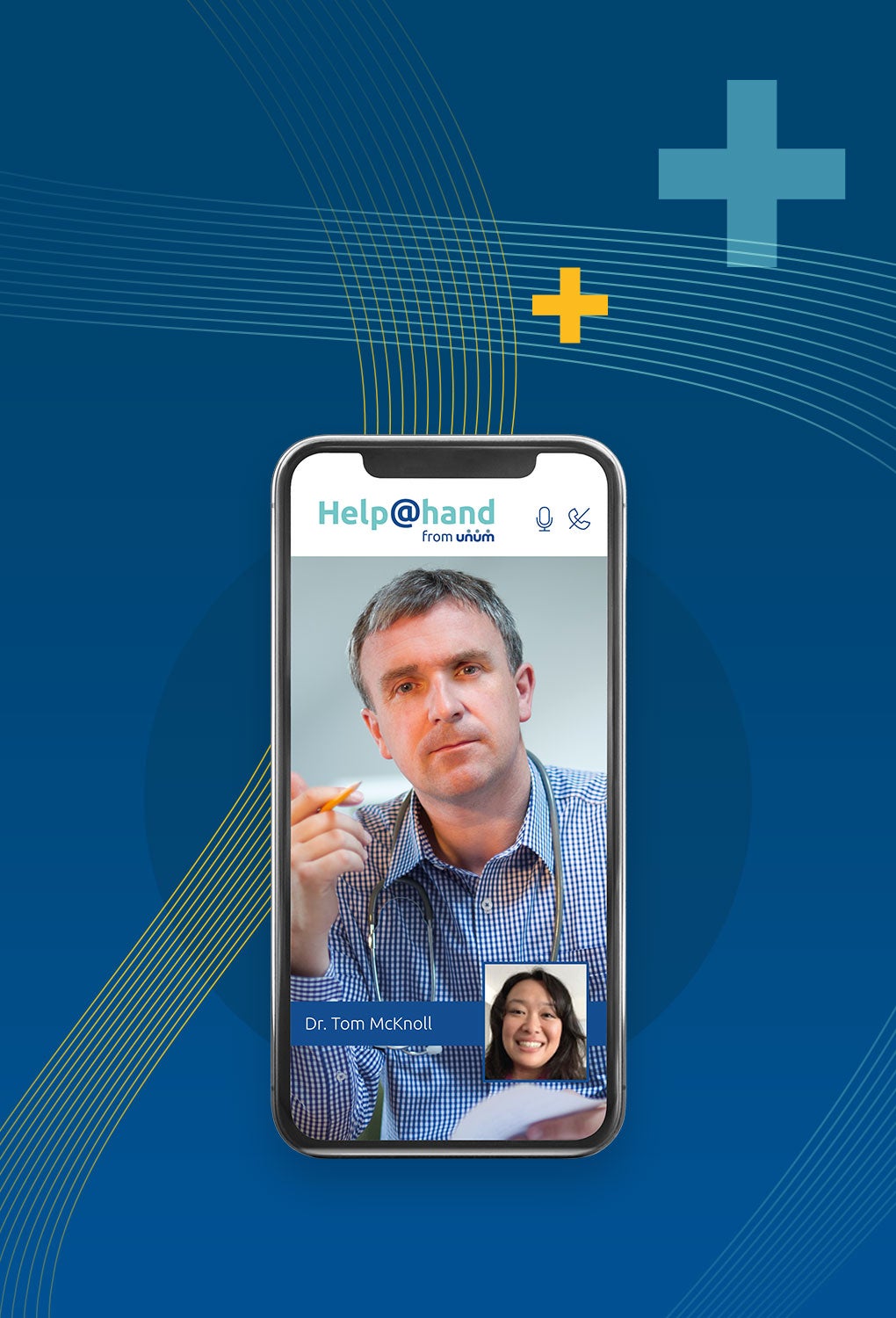
1 Corporate Adviser Workplace Protection and Wellbeing Report 2024
2 Help@hand from Unum is provided to Unum Limited (“Unum”) customers by third-party specialist providers chosen by Unum. Unum is not the provider of the Services. The Services are entirely separate from the insurance policy provided by Unum. Access to the Services is facilitated by Unum at no cost to the Unum customer, and Unum may change or withdraw access to the Services at any time. Use of the Services are subject to the terms and conditions of the relevant third-party specialist providers. Services are available to UK residents only. For further information, please go to unum.co.uk/frequently-asked-questions/services.